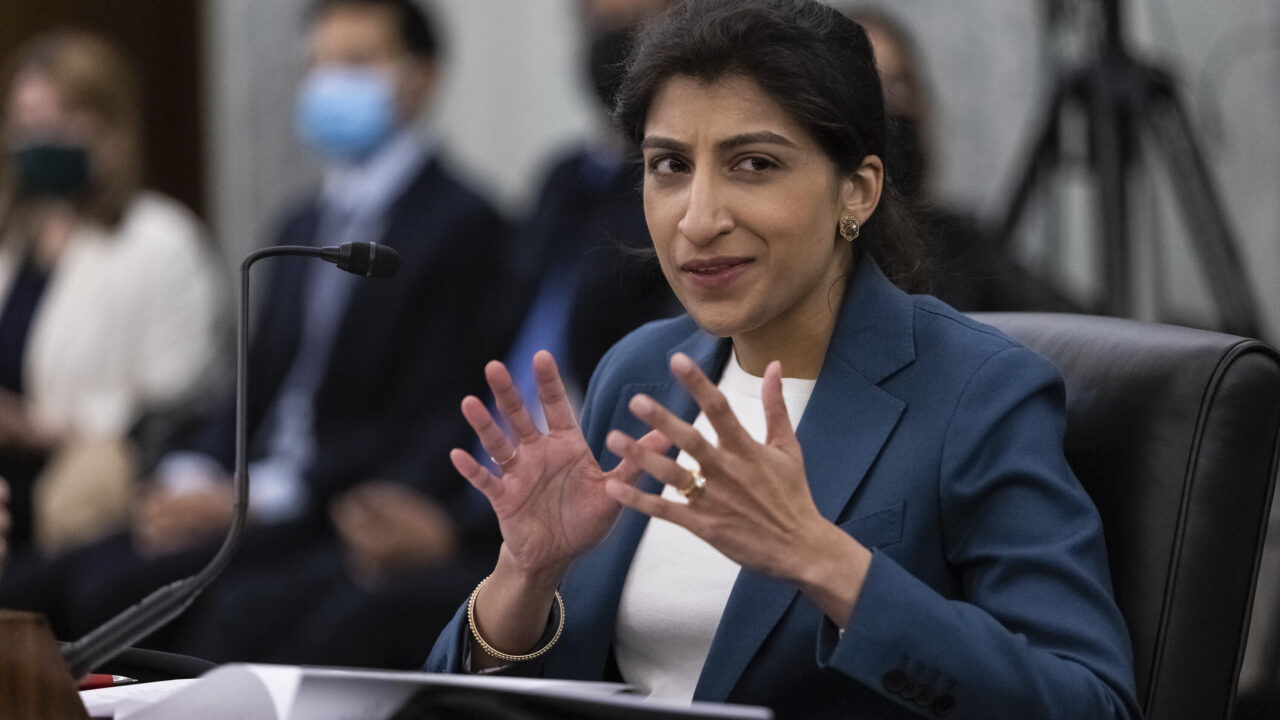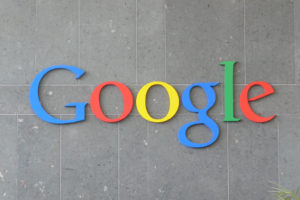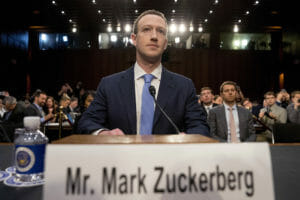NYT Questions FTC’s Attempts to Curb Corporate Power
NYT says a loss in court “raises fresh questions” for the FTC—questions coming from the monopolies she wants to rein in. FTC Commissioner Lina Khan. Photo: Graeme Jennings / AP.
FTC Commissioner Lina Khan. Photo: Graeme Jennings / AP.
The Federal Trade Commission (FTC) lost a key antitrust case on July 11 after a federal judge rejected the agency’s move to halt Microsoft’s $69 billion acquisition of video game holding company Activision Blizzard.
FTC Chair Lina Khan has argued that, win or lose, the mere act of taking tech behemoths to court would be a partial victory by signaling the pressing need to update antitrust laws for today’s digital economy (New York Times, 12/7/22). But the Times‘ Cecilia Kang (7/11/23) wrote that the latest rulings “raise questions” about Khan’s strategy, with “critics…speaking out more loudly.” As to which critics are raising these questions, the Times buries the lead.
The three critical voices, representing a “tide of criticism,” as the Times described it, represent industry and the right. Adam Kovacevich, chief executive of Chamber of Progress (identified as “a tech trade group”), is quoted, “All these court losses are making their threats look more like a paper tiger.” Chamber of Progress lists among its “partners” companies like Amazon, Google and Meta, each of which have been sued by the FTC on several occasions for monopolistic business practices. The group has been outspoken against government antitrust efforts.
The Times made minimal effort to point out the monetary incentives or ideological biases of the people it quoted who supposedly represent growing criticism of the FTC.
Ashley Baker of the Committee for Justice, identified by the Times as “a conservative think tank,” added that the FTC has “crossed the line to being reckless with the cases they are bringing.” Baker is more relevantly identified as the founder of the Alliance on Antitrust, described by Washington Monthly (5/25/21) as “an organization dedicated to pushing a pro-monopoly line on Republicans.” The Alliance’s member organizations, the Monthly reported, “receive financial support from Big Tech,” as well as “from monopolistic corporations in other sectors such as oil and gas, Big Ag, telecom, banking and pharmaceuticals.”
And Anthony Sabino said, “She’s trying to change a century’s worth of antitrust law overnight, and that’s not necessarily wise.” He’s identified as “a professor of business and law at St. John’s University”—but he’s also a corporate lawyer with a specialty in antitrust law. It’s not surprising that he doesn’t think strengthening antitrust regulation is “necessarily wise.”
The Times made minimal effort to point out the monetary incentives or ideological biases of the people it quoted who supposedly represent growing criticism of the FTC.
Of the four experts quoted in this piece, only one of them is not immediately critical of Khan: Eleanor Fox, a professor emeritus at New York University’s law school, who is inserted at the very end of piece, saying that the FTC chair “is only an outlier in the US, not globally.”
Indeed, other developed countries and blocs are taking a more active role in litigating the US’s Big Tech firms over antitrust concerns. Last month, the European Union charged Google with violating the bloc’s antitrust laws (New York Times, 6/14/23).
Framing the current FTC leadership as extremist is important because, as the Times noted, Khan had to appear July 13 at a House Judiciary Committee hearing. The Republican-led panel, according to its own website, was to investigate “examine mismanagement of the FTC and its disregard for ethics and congressional oversight under Chair Lina Khan.”
That supposed “disregard for ethics” has nothing to do with any monetary conflict, which has plagued the FTC for generations and soured the agency’s reputation (The Hill, 12/6/18; Vice, 5/23/19). Instead, according to internal documents from ethics officials obtained by Bloomberg (6/16/23) last month, Lorielle Pankey, FTC’s designated ethics official, had recommended Khan recuse herself from the agency’s 2022 review of Meta. Khan, Pankey noted, had made comments in the past calling on the FTC “to block any future acquisition by Facebook”—though Pankey acknowledged that Khan’s decision not to recuse “is not per se a federal ethics violation” (CNBC, 6/16/23).
Framing the current FTC leadership as extremist is important because, as the Times noted, Khan had to appear July 13 at a House Judiciary Committee hearing.
To put it simply, this ethics official thought the optics of Khan handling Meta’s case were bad because, as a public figure, she has said that antitrust laws should apply to Big Tech —a position that most Americans have agreed with for quite some time (Vox, 1/26/21). Nonetheless, the “issue” has been seized on by the establishment corporate media, pro-corporate Republicans and companies, like Meta (Reuters, 2/2/23) and Amazon (New York Times, 6/30/21), that feel that Khan’s public statements that the law should apply to them constitute some kind of inherent bias.
Bloomberg (6/16/23) quoted Republican former FTC Chair William Kovacic decrying Khan’s rejection of Pankey’s advice as “playing with fire.” The Wall Street Journal (6/18/23) published yet another editorial criticizing Khan—part of a pattern that has seen an attack on Khan in the Journal an average of once every 11 days over the past two years (FAIR.org, 6/23/23). And the right-wing Washington Examiner (6/28/23) explicitly called for a congressional inquiry into the FTC ethics concerns—a call to action that was quickly heeded.
Meanwhile, the Wall Street Journal (6/30/23) noted that Pankey’s financial disclosures show that she holds between $15,001 and $50,000 in Meta stock—a not-insignificant stake in a company under her purview. But it’s the official who committed the ethical breach of promising to break up Big Tech monopolies who faced congressional grilling—because in Washington, as in corporate media, standing up to corporate power is the real scandal.
Your support matters…Independent journalism is under threat and overshadowed by heavily funded mainstream media.
You can help level the playing field. Become a member.
Your tax-deductible contribution keeps us digging beneath the headlines to give you thought-provoking, investigative reporting and analysis that unearths what's really happening- without compromise.
Give today to support our courageous, independent journalists.





You need to be a supporter to comment.
There are currently no responses to this article.
Be the first to respond.